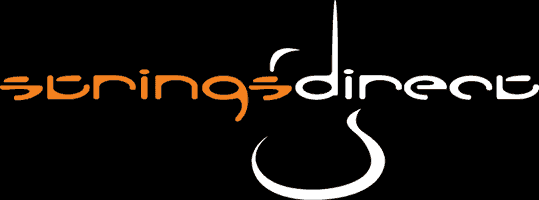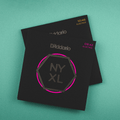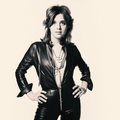ERIC CLAPTON
By Strings Direct – 29 August, 2023
PLAYER SPOTLIGHT
'SLOWHAND'

This instalment sees us open the door on a British Master heralded as one of the world's greatest guitarists.
There are countless descriptions of this man as a player, numerous affectionate nicknames, and iconic imagery which sets him firmly in the Rock 'n' Roll Hall of Fame.
A revolutionary electric guitar player with a career steeped with pivotal moments in guitar hero history, this artist is now just as known for this acoustic guitar playing and style development.
A living legend that has covered so much ground over so many decades, his achievements as an artist songwriter and Guitarist are immeasurable. 🤘
“Eric Clapton. EC. Slowhand. A journeyman, blues legend and undeniable all time great. In a career spanning over half a century, Clapton has proved to be a remarkably adaptable and resilient artist.”
- Matt Wakeling - https://jam.buzz/extra/eric-clapton-guitar-gear-guide/
BORN INTO THE BLUES 🎼
As a young man born in the quaint suburbs of Ripley, Surrey Clapton was somewhat born into the blues before he was even aware of the 'Blues'.
30th March 1945, Eric Patrick Clapton was born to a teenage mother Patricia Molly Clapton of only 16 years of age.
Eric's father was a non-existent entity from the outset due to the fact that he was a Canadian soldier stationed in the UK during World War II. Unfortunately he was already married back in Canada and returned home swiftly.
Eric was raised under his own innocence by his maternal grandparents as his mother was still a teenager herself and it was quite clear she wasn't ready for such responsibility.
It would be at the age of eight that the impending truth and reality was eventually discovered; as a young man Eric discovered that who he thought was his sister was actually his mother and his parents were actually his grandparents, this major life event had a detrimental effect on his future outlook on life and people.
“Eric was raised in a musical household. His grandmother played piano and his uncle and mother both enjoyed listening to the sounds of the big bands. Pat later told Eric’s official biographer, Ray Coleman, that his father was a gifted musician, playing piano in several dance bands in the Surrey area.”
https://www.ericclapton.com/bio
CAREER CLASSES BY CLAPTON 🎸

Another prodigy destined to be involved within the music industry hailing from a very musical background on both sides of his family, Eric's first encounter with the guitar was due to the explosion of rock 'n' roll in 1958.
Like many teenagers at the time Eric asked for a guitar for his 13th birthday which was a German-made steel string Hoyer.
Difficult to play and somewhat unexciting for a young man this was actually put aside quite quickly.
Quite shocking - I think - that such a natural guitar legend didn't automatically bond with the instrument in any form. However, the magical moment hit home when Clapton turned 16 years old; losing interest in college and falling behind due to interest in listening to music (particularly Blues), embedding himself in the myth and legend of the genre.
“Typical of his introspective nature, Eric looked beneath the surface and explored the roots of rock in American Blues. The blues also meshed perfectly with his self-perception as an outsider and of being “different” from other people. Sometime in 1962, he asked for his grandparents’ help in purchasing a £100 electric double cutaway Kay (a Gibson ES-335 clone) after hearing the electric blues of Freddie King, B.B. King, Muddy Waters, Buddy Guy, and others.”
https://www.ericclapton.com/bio

Just one year later at the age of 17 Eric managed to join his first group “The Roosters”. It's at this key moment that he began to carve his legacy; within a short space of time he became one of the most talked about guitar players on the R&B circuit, just playing small pub & club gigs he really started to make an impact on the scene.
In 1963 history was made: Clapton was recruited by the then already iconic and obscenely popular Yardbirds.
18-months of service within the band and Eric had truly started to become one of this country's greatest guitar players.
But as a young man blooming with confidence and belief, he actually quit the band fearing they were straying too far from his beloved blues vibe.
Whilst playing with The Yardbirds Clapton had developed the nickname “Slowhand” due to his tentative style and laid-back approach to lead guitar playing which consisted more not on how many notes he could play but on the right note with the right feel based around his now famous vibrato and just tasteful elegant but also cutting playing style. 🎸 .
The next step in his incredible music career was one that has stamped its place into guitar culture indefinitely...
What happen next is one of those moments when everything meets at the perfect point in time and creates something truly special, truly unexplainable, and genuinely awe inspiring .
The fascination and admiration for his next musical venture has carved its own myth and legacy.

“The band Clapton joined in April 1965, led by vocalist and multi-instrumentalist John Mayall, had an ever-revolving cast and eventually, over 100 different line-ups performed under the Bluesbreakers moniker. Eric actually joined twice – he departed the Bluesbreakers in August to tour Greece with a band called The Glands before returning to the fold in November – but by March 1966, the band were ready to record and headed to Decca Studios with producer Mike Vernon.”
https://guitar.com/review/album/the-genius-of-blues-breakers-with-eric-clapton-by-john-mayall-the-bluesbreakers/
To this day guitarists, fans, and people that just appreciate music in general are completely in awe of this work.
It's not just being another blues record but something special happening here and the main focus is on Eric Clapton's guitar playing and more-so his guitar sound, the sound he got was absolutely revolutionary at the time and even now to this day it's a benchmark for the ultimate guitar tone. 🔊
This one piece here completely defines an impact the listener to disbelief of just how good a guitar and amp piloted by a master can really sound.
“Having moved on from his Yardbirds’ pairing of Telecaster through a Vox, Clapton instead turned to a 1960 Les Paul Standard through a Marshall Model 1962 2×12 combo, both turned up to full with the mic placed two feet from the amp, a Dallas Rangemaster treble booster and a blanket placed over the whole shebang. Clapton said he’d come across the sound accidentally, when trying to emulate Freddie King: “I would use the bridge pickup with all of the bass turned up, so the sound was very thick and on the edge of distortion. I also always used amps that would overload. Everything was on full and overloading” (though photos from the sessions show the Les Paul in middle position, too, and there are a variety of distinct tones on the record, implying Clapton varied his amp gain and treble to suit).
This pairing shook the studio to its foundations and the guitar world to its core for decades to come, and the ‘Beano’ Les Paul – stolen during rehearsals for Cream in 1966 – has become one of the guitar world’s Holy Grail instruments, with its performance on this record possibly even single-handedly saving the model itself from extinction.”
https://guitar.com/review/album/the-genius-of-blues-breakers-with-eric-clapton-by-john-mayall-the-bluesbreakers/

Eric with his treasured Les Paul Standard, which he may have bought from Lew Davis’s shop on Charing Cross Road for the princely sum of 105 guineas (£110.25)
As the heat died down from this iconic moment and the Bluesbreakers lineup changed yet again through natural transition Clapton earned his second and most important nickname to date - “Clapton is God”.
Now seen as one of the standout guitar players not just in this country but in the world he earned his place as a truly respected and gifted musician.
Forming somewhat of a supergroup, that again would be critically acclaimed, he collaborated with two other high-profile session players whom he'd engaged with in the past on previous projects such as John Mayall’s Bluesbreakers.
Formulating a blues super group that would have individual takes on heritage recordings and modern numbers “Cream” consisting of Jack Bruce and Ginger Baker were one of the most iconic rock 'n' roll outfits to ever grace this world.

Cream mutually parted ways due to conflicting egos would you believe it. 😉
From here Clapton slotted in and out of projects with Blind Faith being the following venture and of course Derek And The Dominoes that produced the iconic riff-of-riffs "Layla".
At this stage in his career Eric was heavily associated with the electric guitar, and rightfully so! He was God of the instrument as it were, but as his incredible career progressed it's his association with the acoustic guitar and what he did with that creatively and expressively that we really want to look into.
More so we want to dive into his relationship with acoustic guitar strings as it seems a lot more significant to him as an artist than electric guitar strings believe it or not.
THE MASTER OF UNPLUGGED
Eric faced many turbulent times in his career and suffered personal tragedies, these events had a significant affect on his ability to work and function as a musician and artist continually.
Some very personal and emotionally work came creatively to Eric as an artist during and after these times.
None more significant than in 1992 when Eric Clapton again revolutionised the guitar world but this time with an acoustic guitar and not an electric guitar. ✌️
“Unplugged is a 1992 album by Eric Clapton, recorded at Bray Studios, England in front of an audience for the MTV Unplugged television series.
It includes a version of the successful 1991 single "Tears in Heaven" and an acoustic version of "Layla". Album itself won three Grammy awards at the 35th Annual Grammy Awards in 1993 and became the bestselling live album of all time, and Clapton's bestselling album, selling 26 million copies worldwide.”
https://en.wikipedia.org/wiki/Unplugged_(Eric_Clapton_album)
Already established as a master of the riff with so many iconic pieces to choose from it was this particular moment when he really took his loyal and doting audience by storm.
I think the opening line of “See if you can spot this one” really displayed his newly rediscovered confidence and belief that he is Eric Clapton “Slowhand” and master of the craft.
CLAPTON'S CHOICE
When we come to examine such an icon his strings choice we expect it to be classic, trustworthy and most of all symbolic to his legacy.
There is very little to learn or understand about his choice of string as he has never really brought much attention or significance to the strings on the guitar more to the Guitars themselves.
He is as iconic as many instruments that are embedded in rock 'n' roll history but never really expresses a great deal of interest in the importance or dynamic relationship with Strings choice in regards to playability, feel, and tone.
His official website states to string choices to be the core foundation of his entire set up.
“Guitar Strings: What Kind Does Eric Use?
MARCH 29, 2009
For his electric guitars, Eric uses Ernie Ball .10 to .46 gauge strings. The action is set low. For acoustic guitars, Martin & Co. light gauge .12 to .54 phosphor bronze strings are used. The type of strings used on his resonator guitars (dobros) is unknown.”
https://www.ericclapton.com/news/guitar-strings-what-kind-does-eric-use-22171
Fumbling through the archives we have discovered an interview with Eric's long-serving guitar technician Lee Dickinson.
Again his technician only states the bare minimum and doesn't go into very much detail in regards to why he is set on a particular type of string gauge or brand.
For electric guitar there is one staple and is the go to:
“Ernie Ball Regular Slinky 10 - 46”

“SCND: Is there anything that Eric prefers as far as set-up with his Stratocasters is concerned that would be considered unique?
LEE: No, he uses a pretty standard set-up. We use Ernie Ball strings on all the electrics, both the solid and semi-solid-body guitars. I use a mixture of acoustic strings, but mostly Martin strings on the Martin guitars… they’re very good reliable strings. I get samples of other strings all the time.
People sometimes come up and want us to try other strings. I think over the years my ears have weakened. I have to be in a quiet room to string and restring, then I have to try to remember what the first set of strings sounded like compared with the second. Anyway, we pretty much stick to Ernie Balls and Martin strings.”
https://www.stratcollector.com/news/an-interview-with-eric-clapton-guitar-technician-lee-dickson/
Eric Clapton being the significant guitar hero that he is of course has his own signature string set.
But as we can see not an electric set but acoustic, such a massive player in the electric guitar market for so many decades but it's the acoustic guitar string and tone that people tend to lean towards when looking at Clapton for string inspiration.

“Eric Clapton loves his Martin acoustic guitar strings so much that he wanted to endorse them. We are proud and honored that Martin Guitar makes the strings that Eric trusts to produce his legendary guitar sounds. What does Eric have to say about Martin Strings? "When I play acoustic guitar, whether in a studio or on stage, Martin Strings are my choice. They deliver the sound that I demand." Music to our ears. Available in light and medium gauge 92/8 Phosphor Bronze. Eric Clapton strings are approved for studio and stage, engineered to resist corrosion with legendary tone and playability.”
https://www.martinguitar.com/strings/acoustic/eric-clapton-guitar-strings.html
* * * * *
References
https://www.ericclapton.com/bio
https://en.wikipedia.org/wiki/Eric_Clapton
https://www.whereseric.com/the-vault/guitars-amps-and-related-equipment/guitar-strings-what-kind-strings-does-eric-clapton-use
https://www.vintageguitar.com/2945/eric-clapton/





